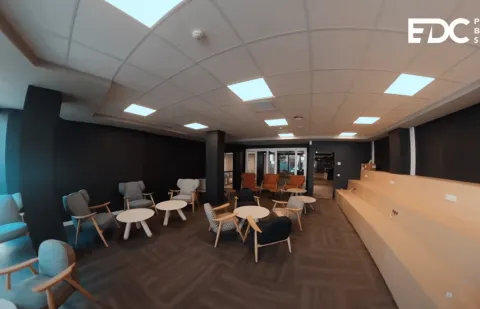
What is lean management ?
Mainly applied in the automotive industry, "Lean management", as its name suggests, consists mainly in optimising production by reducing waste. What are the main features of this continuous improvement method, and how can its effectiveness be guaranteed? If you too would like to develop strong project management skills, find out more about our M.Sc In Management project and learn to develop your qualities as an innovative manager.
Definition of lean management
Lean Management is a management approach that originated in Fordism and aims to improve the effectiveness and efficiency of organisations by eliminating waste and optimising processes. This philosophy of continuous improvement was first modelled by Toyota in the 1950s and has since been widely adopted by many sectors beyond the automotive industry.
The main objective of Lean management is to maximise customer value while minimising the resources required to deliver that value. By applying its principles and techniques, companies of all sizes and in all sectors can achieve significant improvements in efficiency, quality, cost and customer satisfaction.
Complementing Lean management, the Six Sigma method created by Motorola in 1986 focuses on reducing variability and defects to improve quality and reliability. Six Sigma uses a structured approach called DMAIC to : Define objectives and customer needs, Measure current process performance, Analyse data to find the causes of problems, Improve the process by eliminating these causes and Monitor the improved process to maintain gains.
What are the principles of Lean management ?
Principle 1: Define value
Lean management seeks to understand what is really important to the customer, and to focus efforts on what adds value.
Principle 2: Map the value stream
Steps in the production or service process are analyzed to identify and eliminate those that do not create value (waste).
Principle 3: Create a continuous flow
Work is organized so that the product or service moves smoothly through the production process, without stoppages or interruptions.
Principle 4: Install a pull system
We produce only what the customer asks for, when they ask for it, in order to reduce inventories and lead times.
Principe 5 : Perfectionner le processus
We continually strive to improve processes by eliminating waste and optimizing added value.
Advantages of implementing Lean methodology in project management
Benefit 1: Reduced waste
Lean methodology actively identifies and eliminates waste in project processes, such as waiting time, unnecessary processes, excessive movement and effort. By reducing these wastes, projects can be completed faster and at lower cost, while maintaining or improving quality.
Benefit 2: Improved productivity
The Lean approach improves efficiency and productivity by simplifying and streamlining project processes. By promoting a continuous workflow and reducing interruptions, teams can focus on value-added tasks, accelerating project execution and shortening development cycles.
Benefit 3: Flexibility
Lean favors an adaptable approach to project management. By implementing continuous improvement cycles and fostering a culture of rapid feedback, Lean projects can adapt quickly to changing customer or market needs, reducing risk and increasing the chances of project success.
Benefit 4: Improved quality
By focusing on reducing defects, projects managed with a Lean approach tend to produce higher quality results. By identifying and resolving quality problems at their source, teams can reduce non-conformance costs and improve customer satisfaction.
Benefit 5: Better risk management
The Lean approach enables risks to be identified more effectively, thanks to better visibility of processes and improved communication within the team. By anticipating potential problems and reacting quickly, teams can avoid or minimize negative impacts on projects.
5 Lean tools every project manager should use
Tool 1: The value stream diagram
The Value Stream Diagram is a fundamental Lean tool for visualizing the stages in the value-creation process, from raw material input to customer delivery. By mapping the value stream, project managers can clearly identify value-added activities and process waste (such as waiting, excess inventory, or unnecessary movements). This helps to optimize workflows, reduce delivery times and improve overall project efficiency.
Tool 2: The Kanban system
The Kanban system is a visualization tool that helps manage work by highlighting the different phases of a project and limiting work in progress to avoid overload. By using Kanban boards and cards to represent tasks, teams can easily see how work is progressing, identify bottlenecks and adjust workflows to improve efficiency. This tool promotes continuous delivery and can be adapted to different types of project.
Tool 3: The 5S
The 5S (Sort, Set in order, Shine, Standardize, Sustain) is a method for organizing a workspace efficiently and effectively. By applying 5S, project managers can reduce clutter, improve productivity and create a safer, more pleasant working environment.
Tool 4: PDCA (Plan-Do-Check-Act)
The PDCA cycle is an iterative tool used for continuous process improvement. It encourages teams to plan actions (Plan), execute them (Do), check the results (Check) and act on this information to improve (Act). By applying the PDCA cycle, project managers can systematically identify and resolve problems, refine processes and improve overall project performance.
Tool 5 : Poka-Yoke
Poka-Yoke is a Lean concept designed to prevent errors before they occur, or to make them immediately obvious. By integrating error prevention mechanisms or alerts into processes, project managers can reduce defects, improve quality and increase efficiency. Poka-Yoke can be applied to various aspects of a project, from software development processes to administrative procedures.
Would you like to learn management skills by mastering key concepts and management tools? Follow our M.Sc In Management project to acquire in-depth knowledge of innovative project management.
THE LATEST NEWS
Your campus at La Défense !
29 09 2021 | Our news
Watch a video of your new campus in the heart of La Défense
Rentrée décalée janvier 2022 : une nouvelle chance d’intégrer une Grande Ecole de management sans perdre votre année !
24 08 2021 | Admissions I Concours I Nos actualités
Vous êtes titulaire du baccalauréat et toujours en recherche de formation en grande école ? Vous avez choisi une orientation pour vos études supérieures qui ne vous correspond pas ? Dès le 25 janvier 2022, EDC Paris Business School vous offre la possibilité de ne pas perdre votre année grâce à sa rentrée décalée en cursus accéléré pour le Programme Grande Ecole et le Bachelor.


